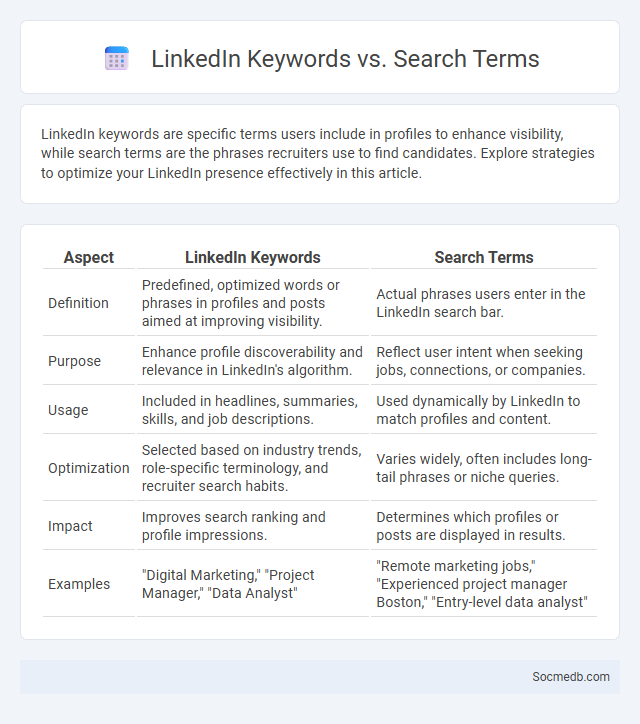
Photo illustration: LinkedIn Keywords vs Search Terms
LinkedIn keywords are specific terms users include in profiles to enhance visibility, while search terms are the phrases recruiters use to find candidates. Explore strategies to optimize your LinkedIn presence effectively in this article.
Table of Comparison
| Aspect | LinkedIn Keywords | Search Terms |
|---|---|---|
| Definition | Predefined, optimized words or phrases in profiles and posts aimed at improving visibility. | Actual phrases users enter in the LinkedIn search bar. |
| Purpose | Enhance profile discoverability and relevance in LinkedIn's algorithm. | Reflect user intent when seeking jobs, connections, or companies. |
| Usage | Included in headlines, summaries, skills, and job descriptions. | Used dynamically by LinkedIn to match profiles and content. |
| Optimization | Selected based on industry trends, role-specific terminology, and recruiter search habits. | Varies widely, often includes long-tail phrases or niche queries. |
| Impact | Improves search ranking and profile impressions. | Determines which profiles or posts are displayed in results. |
| Examples | "Digital Marketing," "Project Manager," "Data Analyst" | "Remote marketing jobs," "Experienced project manager Boston," "Entry-level data analyst" |
Understanding LinkedIn Keywords: Definition and Importance
LinkedIn keywords are specific words and phrases used within profiles, job descriptions, and posts to improve visibility and attract relevant connections or opportunities on the platform. These keywords represent essential skills, industry terms, and roles that recruiters and algorithms prioritize during searches. Optimizing Your LinkedIn profile with targeted keywords enhances discoverability, increasing the chances of being noticed by potential employers or professional contacts.
What Are Search Terms on LinkedIn?
Search terms on LinkedIn refer to the specific keywords and phrases users enter into the platform's search bar to find people, jobs, companies, groups, or content relevant to their interests and professional goals. These search terms play a crucial role in enhancing visibility by aligning profiles and posts with commonly used industry-specific keywords, improving LinkedIn's algorithmic matching. Optimizing LinkedIn profiles with targeted search terms increases opportunities for networking, job discovery, and business development within professional communities.
Key Differences Between Keywords and Search Terms
Keywords are pre-selected words or phrases that marketers target in social media campaigns to reach specific audiences, while search terms represent the actual words users type into search engines or social media search bars. Your campaign's success depends on analyzing both to refine targeting strategies and maximize engagement. Understanding this distinction allows you to optimize content and advertising efforts more effectively.
The Role of Keyword Optimization in LinkedIn Success
Keyword optimization plays a crucial role in LinkedIn success by improving profile visibility and attracting relevant opportunities. By strategically incorporating industry-specific keywords into your headline, summary, and experience sections, you increase the chances of appearing in recruiter searches and professional network algorithms. Your optimized profile effectively connects you with targeted audiences, enhancing career growth and networking potential.
How LinkedIn’s Algorithm Interprets Keywords
LinkedIn's algorithm prioritizes profile and post content by analyzing keywords to match user searches with relevant skills, job titles, and industry jargon, enhancing visibility for recruiters and professionals. It assesses keyword frequency, placement in headlines, summaries, and job descriptions, optimizing ranking in search results within professional networks. Using natural language processing, LinkedIn detects context and semantic relevance to deliver personalized content and connection suggestions tailored to user interactions and preferences.
Best Practices for LinkedIn Keyword Research
Effective LinkedIn keyword research starts with analyzing job descriptions and industry-specific terminology to identify high-traffic search terms. Incorporate targeted keywords naturally into your profile headline, summary, and experience sections to boost visibility in LinkedIn's search algorithm. Regularly update keywords to reflect evolving trends and maintain alignment with your professional goals and network demands.
Optimizing Your LinkedIn Profile with Relevant Keywords
Optimizing your LinkedIn profile with relevant keywords enhances visibility to recruiters and industry professionals by aligning your skills and experiences with common search terms. Incorporate keywords naturally in your headline, summary, and job descriptions to reflect your expertise and target job roles effectively. Utilizing specific industry-related terms and certifications increases the chances of your profile appearing in targeted LinkedIn searches and automated applicant tracking systems.
Common Mistakes in LinkedIn Keyword Optimization
Common mistakes in LinkedIn keyword optimization include keyword stuffing, using overly generic terms, and neglecting the relevance to the job or industry. Many users fail to incorporate specific skills, certifications, and industry-related jargon that recruiters frequently search for. Optimizing the LinkedIn profile headline, summary, and experience sections with precise keywords improves visibility and matching in LinkedIn's search algorithm.
Measuring the Impact of Keywords on LinkedIn Visibility
Measuring the impact of keywords on LinkedIn visibility involves analyzing how specific terms influence profile searches, connection requests, and content reach. Using LinkedIn's search analytics and keyword tracking tools, you can identify which keywords drive higher engagement and improve your ranking in search results. Optimizing your profile and posts with these targeted keywords ensures Your presence becomes more discoverable to recruiters and industry peers.
Actionable Tips for Effective LinkedIn Keyword Strategy
Optimize your LinkedIn profile by incorporating relevant industry keywords in your headline, summary, and experience sections to improve search visibility. Use a mix of broad and niche keywords tailored to your target audience and career goals to attract recruiters and potential connections. Regularly update your keywords based on LinkedIn analytics and trending terms to keep your profile competitive and aligned with your professional growth.
 socmedb.com
socmedb.com